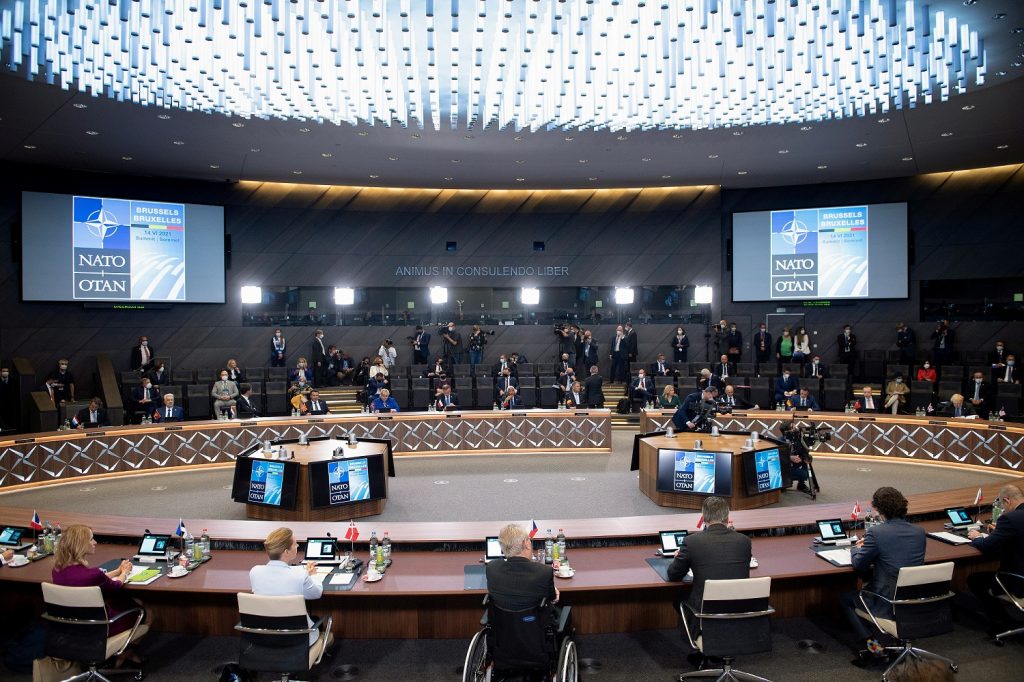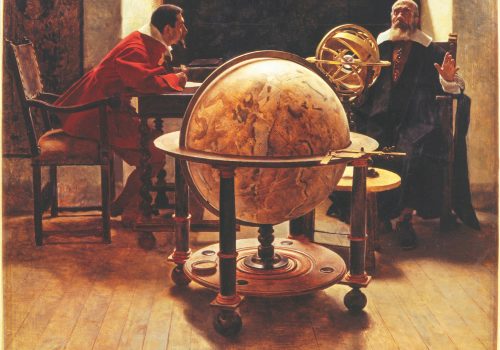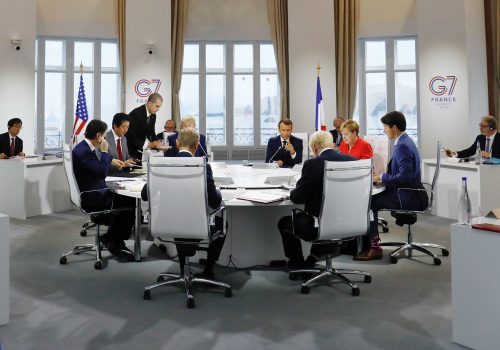An Alliance of Democracies: From concept to reality in an era of strategic competition
This is the third in a five-part series of Atlantic Council publications calling for the United States and its allies to revitalize the rules-based international system and establish new institutions to strengthen cooperation among democracies to succeed in an era of strategic competition.
The first, Present at the Re-Creation: A Global Strategy for Revitalizing, Adapting, and Defending a Rules-Based International System, sets forth an overarching global strategy for the United States and its allies that focuses on the need to strengthen cooperation among democracies, while simultaneously seeking to engage other global powers in areas of common interest.
The second, From the G7 to a D-10: Strengthening Democratic Cooperation for Today’s Challenges, proposes the creation of a new D-10 as a core group of leading democracies to develop joint strategies for addressing today’s most pressing global challenges.
This report makes the case for an Alliance of Democracies and draws on relevant sections from these two publications.
Executive summary
On December 9–10, President Joe Biden will host a Summit for Democracy, a virtual event to which the leaders of more than one hundred democracies worldwide have been invited. The summit is aimed at setting forth an affirmative agenda for “democratic renewal” and tackling “the greatest threats faced by democracies today through collective action.”1 “The Summit for Democracy,”US Department of State, 2021, https://www.state.gov/summit-for-democracy/. This will kick off what the administration is calling a “year of action,” which will culminate in a second summit, this time in person, approximately one year later.
The summit convenes at a time when democracy is facing unprecedented challenges. Autocratic powers, particularly China and Russia, have become more assertive in challenging key tenets of the global system, each in their own ways but increasingly aligned, as they engage in coercive tactics to expand their influence.2 Ash Jain and Matthew Kroenig, From a G7 to a D-10: Strengthening Democratic Cooperation for Today’s Challenges, Atlantic Council, June 8, 2021, https://www.atlanticcouncil.org/in-depth-research-reports/report/from-the-g7-to-a-d-10-strengthening-democratic-cooperation-for-todays-challenges/. Meanwhile, democracies are on the defensive as they seek to contend with these global threats. Many nations, including the United States, face deeply polarized electorates and increasing distrust in institutions among their own citizens. As Biden has highlighted, the world is in the midst of a fundamental debate—an inflection point—between “those who argue that autocracy is the best way forward” and “those who understand that democracy is essential to meeting [today’s] challenges.”3 Joe Biden, “Remarks by President Biden at the Virtual 2021 Munich Security Conference,” White House, February 19, 2021, https://www.whitehouse.gov/briefing-room/speeches-remarks/2021/02/19/remarks-by-president-biden-at-the-2021-virtual-munich-security-conference/.
To succeed in this new era, the United States and its democratic allies and partners must strengthen cooperation. Working together, leading democracies retain a preponderance of power over China and other revisionist autocracies that would allow them to decisively shape global outcomes. But they need new institutions, formal and informal, that are fit for purpose, and reflect the evolving global distribution of power and the nature of today’s challenges. While institutions created in the post-World War II era, such as the North Atlantic Treaty Organization (NATO), have convened democracies for decades, most are segmented by geographic region. But this system of institutions requires adaptation and renewal to address the challenges of today’s world. The United States and its allies need new entities that facilitate cooperation not just in specific regions, but among larger groups of democracies worldwide.4 Jain and Kroenig, From a G7 to a D-10.

An Alliance of Democracies could play an essential role in this regard. It would serve as a political alliance aimed at forging common threat assessments and coordinating strategies among democracies to position the free world for success in the growing strategic competition with revisionist autocratic powers. The alliance would help foster cooperation to defend against a wide range of threats to democratic countries, counter authoritarianism, and advance shared interests and values.
Support for closer alignments among democracies is building. In hosting the Group of Seven (G7) summit earlier this year, British Prime Minister Boris Johnson sought to advance the idea of a D-10 club of democracies.5 Patrick Wintour, “UK Plans Early G7 Virtual Meeting and Presses Ahead with Switch to D10,” Guardian, January 15, 2021, https://www.theguardian.com/world/2021/jan/15/uk-plans-early-g7-virtual-meeting-and-presses-ahead-with-switch-to-d10. Lawmakers in the United Kingdom (UK) and Canada have expressed support for new coalitions of democracies, and the “traffic light coalition” that will form a new government in Germany explicitly referenced support for initiatives such as an “Alliance of Democracies” in a recent policy paper.6 Boris Ruge (@RugeBoris), “Today #SPD #Greens #FDP agreed to proceed to negotiations on a [traffic light] coalition for #Germany. As for me, I was delighted to see they not only highlighted the importance of #transatlantic relations but already agreed on the need for a national #security #strategy—real progress,” Twitter, October 15, 2021, 9:44 a.m., https://twitter.com/RugeBoris/status/1449023379856633857?s=20. In the United States, proposals for closer cooperation among democracies have drawn bipartisan support among lawmakers in Congress.
In addition, former US Secretary of State Madeleine Albright and former US National Security Advisor Stephen Hadley were joined by distinguished former officials from nineteen democracies worldwide—including former NATO Secretary General Anders Fogh Rasmussen, former Swedish Prime Minister Carl Bildt, and former Japanese Foreign Minister Yoriko Kawaguchi—in endorsing a Declaration of Principles that called for partnerships that bring together likeminded governments, including “a potential new alliance of free nations” to advance a rules-based order.7Declaration of Principles for Freedom, Prosperity, and Peace, Atlantic Council, 2019, https://www.atlanticcouncil.org/declaration/. A call to create such an alliance was also made by signatories to the Copenhagen Charter for an Alliances of Democracies, issued earlier this year, which includes the heads of the National Endowment for Democracy, National Democratic Institute, and International Republican Institute.8“Copenhagen Charter for an Alliance of Democracies,” Alliance of Democracies Foundation, 2021, https://www.allianceofdemocracies.org/initiatives/the-copenhagen-democracy-summit/copenhagen-charter/.
The alliance would help foster cooperation to defend against a wide range of threats to democratic countries, counter authoritarianism, and advance shared interests and values.
Biden’s call for a Summit for Democracy and the underlying rationale for convening such a summit—advancing democratic cooperation in the context of a global struggle between democracy and autocracy—could help propel the idea of an alliance forward. The administration’s plan for a series of summits—one this year and one next—could engender habits of cooperation among democracies, providing the building blocks for a sustainable network of democracies. If these summits continue on an annual basis, they could serve as a de facto alliance, leaving the door open to a more formalized entity down the road.
This report explains why an Alliance of Democracies is needed today, and how the leaders of the free world should act to bring this concept into reality. It describes the strategic context for the creation of such an alliance, its potential mission and organizational structure, and its proposed membership – initially, perhaps thirty or forty consolidated democracies that share concerns about challenges to the free world and are committed to taking action. The report proposes specific areas around which to prioritize alliance action. It addresses concerns that have been raised about an Alliance of Democracies, and contends that the strategic benefits of such an alliance outweigh the costs, including the political and diplomatic capital that would be required to create it. The report describes how an Alliance of Democracies could galvanize meaningful cooperation on global challenges and help restore confidence in the free world.



